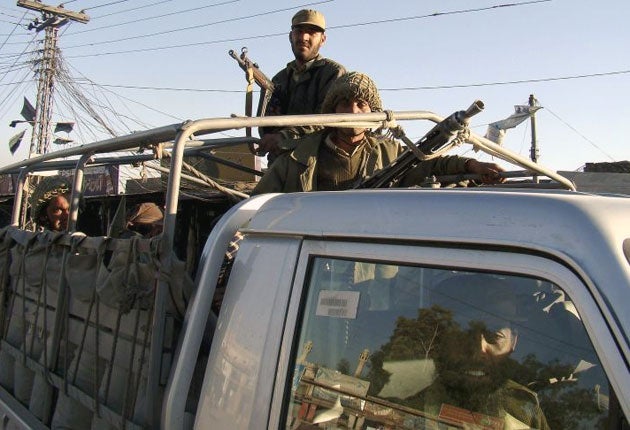Battle of Khyber Pass key to ending to Taliban raids
Pakistan launches major offensive as America prepares to double deployment in Afghanistan

Pakistan has closed the principal route used to channel supplies to American and Nato troops in Afghanistan as it launches a military offensive to secure the area against insurgents.
Troops, backed by helicopter gunships and tanks, moved into the Khyber Pass area near Pakistan's north-west border yesterday.
More than three-quarters of all food, fuel and war material destined for American and Nato troops in landlocked Afghanistan passes along the narrow and winding 35-mile cut through the Hindu Kush mountains that has served as a strategic trade and military route since Alexander the Great's advance into India.
Over the past month, the supply line has come under attack from militants loyal to a Taliban commander. The Pakistani army began its operation after the militants spurned an offer to surrender, local officials said.
"Because of these operations, supplies have been suspended to Afghanistan and vice versa," Fazal Mehmood, a civilian administrator in the Khyber tribal agency, said.
Securing the route is a key priority for the US as it plans to double its deployment in Afghanistan next year to 60,000 troops. "We are glad that they're helping clean out what they call miscreants in that area that have been attacking the supply line," said Colonel Greg Julian, a US military spokesman in Afghanistan. "Temporary closure [of the supply line] is not a problem. It's best that they conduct this operation and clear out these trouble spots."
The New York Times reported yesterday that the US and Nato were planning to open and expand supply lines through central Asia, to create an alternative "northern corridor". Some supplies would be purchased locally and trucked into Afghanistan. Other items might be sent to Baltic ports and transported along Russia's railway lines.
Masked Taliban gunmen mounted half-a-dozen raids on depots in Peshawar city this month. On 8 December, about 200 masked gunmen led by Hakimullah Mehsud – a close associate of the chief Taliban commander Baitullah Mehsud – blocked the road, collected petrol from a station to pour over 100 trucks, and set them alight.
In what was a sign of the growing lawlessness around the city, where there has been a spate of kidnappings and murder, Pakistani security forces were helpless to intervene.
Beyond the city, the convoys pass through the Khyber tribal agency which is in effect controlled by Taliban forces. This month's attacks prompted the Khyber Transport Association, which carries about 60 per cent of the cargo, to go on strike.
Mehmood Shah, a former head of security for the tribal areas based in Peshawar, said security along the route had suffered after the country's troops were last week redeployed to the eastern border with India amid escalating tensions between the two countries.
"Because of the shortage of troops, the depots were left vulnerable. Only a battalion or squadron of tanks was available, leading to the need for a military operation."
Some Pakistani military analysts suspect there may be also be "domestic political motives" behind the move to suspend the supply route. "It would be a very popular move at home, and will pressure the international community," said the defence specialist Ayesha Siddiqa. Pakistan's largest Islamist party has called for demonstrations against the supply route, in protest against the 20-plus CIA-operated missile strikes that have targeted militants in the tribal areas since August.
"This obviously means that they want to build pressure on the international system to use its influence on India to restrain Indian policies towards Pakistan," said Hasan Askari-Rizvi, professor of political science at a Lahore university,
Yesterday, Shah Mahmood Qureshi, Pakistan's Foreign Minister, appealed to India to pull back its jets and troops as Pakistan stepped up its efforts to defuse cross-border tensions.
"I understand India has activated their forward air bases, and I think if they are deactivated, then it will be a big positive signal," Mr Qureshi said. "Similarly, as far as their ground forces are concerned... if they relocated to their peacetime positions, then it will also be a positive signal."
The President, Asif Ali Zardari has made similar statements, as has General Ashfaq Kayani, the taciturn army chief who last week called for conflict to be avoided. Pakistani military and government officials insist that it moved troops to the border with India in a response to Indian redeployments.
Subscribe to Independent Premium to bookmark this article
Want to bookmark your favourite articles and stories to read or reference later? Start your Independent Premium subscription today.

Join our commenting forum
Join thought-provoking conversations, follow other Independent readers and see their replies